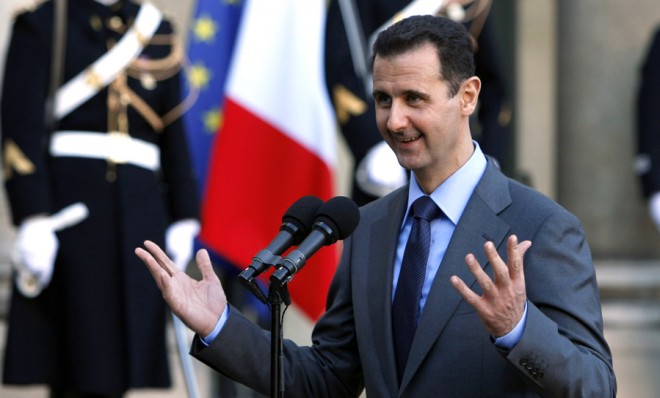Did Bashar al-Assad's PR blitz pay off?
President Obama's decision to delay military action in favor of diplomacy comes in the wake of Syria's aggressive charm offensive


A free daily email with the biggest news stories of the day – and the best features from TheWeek.com
You are now subscribed
Your newsletter sign-up was successful
President Obama is delaying military action against Syria, but not backing off of his determination to hold Syrian President Bashar al-Assad accountable for his regime's alleged gassing of its own people.
Still, the fact that Obama is talking about Assad — instead of raining bombs down on him — marks a pretty significant improvement in the embattled Middle Eastern leader's circumstances.
Secretary of State John Kerry played a significant role in the sudden shift, as he was the one who suggested that Assad could avoid U.S. air strikes if he surrendered his stockpile of chemical weapons. Russia turned Kerry's rhetorical suggestion into a serious diplomatic proposal. But these developments came after Assad launched an aggressive charm offensive designed to soften his image and cast doubt on White House charges that Assad's military was behind an August chemical attack that killed an estimated 1,400 people in a rebel-held neighborhood outside Damascus.
The Week
Escape your echo chamber. Get the facts behind the news, plus analysis from multiple perspectives.

Sign up for The Week's Free Newsletters
From our morning news briefing to a weekly Good News Newsletter, get the best of The Week delivered directly to your inbox.
From our morning news briefing to a weekly Good News Newsletter, get the best of The Week delivered directly to your inbox.
First came a barrage of photos posted on the Syrian president's Instagram account, focusing heavily on Assad's photogenic wife, Asma, who has been compared to Princess Diana and was once the subject of a gushing profile in Vogue. In the Instagram pictures, Asma Assad comforts the sick, hugs children, and feeds the poor. "Still dressed fashionably and wearing full-makeup," said Colleen Curry at ABC News, "Asma presents a stark contrast to other images leaking out of Syria as Assad's forces and rebel forces battle viciously for control of cities." Take a look at one of her snapshots:
Then, Assad himself shifted into PR mode, granting an interview to Charlie Rose that assured him exposure in the West. Assad calmly presented himself to Rose as the victim of a smear campaign from Washington. "There has been no evidence that I used chemical weapons against my own people," Assad said. He went on to counter Kerry's claim that the United States has evidence that Assad's forces launched the rockets with poison payloads, insisting that "the Russians have completely opposite evidence."
Of course, the idea that Assad can truly charm anyone — after orchestrating a war on the opposition that has left more than 100,000 dead — is pretty easy to mock. Cue Jon Stewart at The Daily Show:
Still, the timing suggests that Assad's PR blitz paid off, at least a little. "Even before President Barack Obama put his plans to strike the Syrian regime on hold, he was losing the battle of public opinion about military intervention," says David Kenner at Foreign Policy. Assad might not have won over all Americans, Kenner says, but he succeeded in wooing some on the American right by selling himself to sympathetic media as the reasonable one, and accusing al-Qaeda-linked rebels of trying to frame him for chemical attacks.
A free daily email with the biggest news stories of the day – and the best features from TheWeek.com
Assad supporters' claims have repeatedly been republished unquestioningly by right-wing commentators in the United States, who share their hostility toward both Sunni Islamists and the Obama administration. It's a strange alliance between American conservatives and a regime that was one of America's first designated state sponsors of terror, and continues to work closely with Iran and Hezbollah. [Foreign Policy]
Max Fisher at The Washington Post says that Assad clearly has "a nuanced understanding of American politics and of the U.S. debate over strikes — and where it's weakest." Assad didn't use the interview to slam the West, the way he might have to a domestic audience, Fisher says. Instead, the Syrian leader touched on "two of the arguments against strikes that have carried the most weight in the United States": Any intervention would play into the hands of al Qaeda, and would be based on unproven accusations of chemical warfare.
Bottom line? Assad probably didn't convince anybody he's a good guy; he just pushed all of the right buttons.
Harold Maass is a contributing editor at The Week. He has been writing for The Week since the 2001 debut of the U.S. print edition and served as editor of TheWeek.com when it launched in 2008. Harold started his career as a newspaper reporter in South Florida and Haiti. He has previously worked for a variety of news outlets, including The Miami Herald, ABC News and Fox News, and for several years wrote a daily roundup of financial news for The Week and Yahoo Finance.
